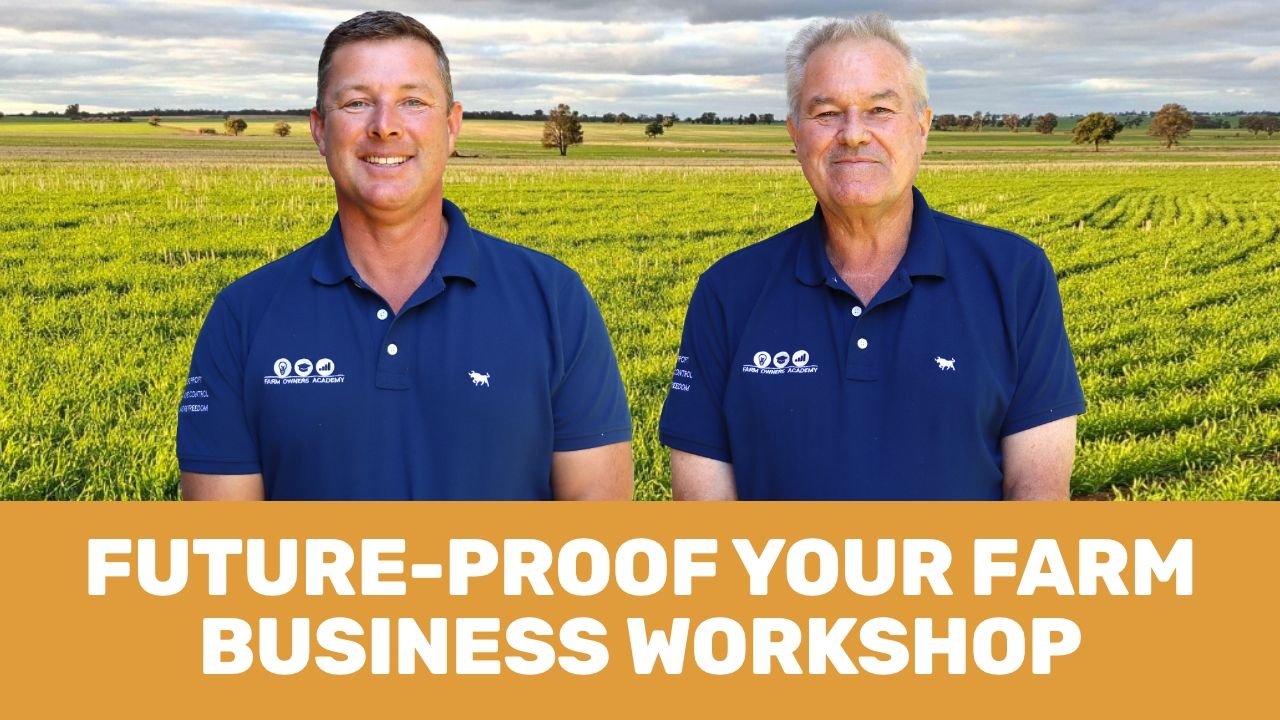Making Farm Succession Work
Jan 20, 2023
For many farming families, the word ‘succession’ can bring up high emotions, difficult memories or a feeling of overwhelm. Here at Farm Owners Academy, alongside Tony from Catapult Wealth, we recognise that succession planning is often an emotionally-charged, complicated and challenging process. I spoke about this topic with Tony on Episode 45 of The Profitable Farmer Podcast, and it’s such an important topic, we feel it worth revisiting on our Freedom Farmer Blog.
What makes succession planning so difficult? Old and new generations can be afraid of ‘upsetting the apple cart’, children and parents may both wait indefinitely for the other to broach the discussion, and few are equipped to deal with the difficult emotional web that can arise. As such, succession planning is often put on the back burner or ignored, which in the long term only creates problems that become increasingly difficult to resolve.
Having an unbiased, unemotional person helping to navigate succession can be extremely helpful. Tony offers his frank and practical insights into succession planning, based around his own experiences both personally and professionally, and to assure us that with the right skills and a positive mindset, succession planning can and should deliver a positive outcome for old and new, on and off-farm generations.
What is it, and why is it important?
Tony first identifies a common misconception amongst farmers that succession planning is a static document or event, completed once and then not brought up again. In fact, succession planning should be an intrinsic part of good business governance, which would ensure that succession is on the agenda of frequent advisory and family board meetings as a constant, ongoing and changing conversation.
Any business requires succession planning as part of their forward planning for the future, and a family farm is no different. Risk mitigation is an essential part of any good business plan, so a lack of effective, open succession planning should be viewed as a significant risk to the running and future of your farming business.
Why getting away from “promises” is better for everyone in the long run
Many individuals working within a family business structure live “on a promise” that they will inherit the farm in fifteen, twenty or thirty years time. However, this can also create a real sense of imprisonment as the years tick by and the individual feels it’s now too late to leave. This can create significant conflict within families and demonstrates the need for clear written and communicated frameworks to be implemented so that everyone working on the farm has as many certainties in their day to day life as possible.
This includes activities like agreed upon hours, pay, holidays, specific job descriptions, dates of starting work, etc. Having clear certainties like these improves the operational running of the farm, as well as the emotional and mental health of its workers, all of which affects relationships within a family. The value of such a framework not just for succession planning but for operational planning as well, cannot be underestimated.
The two types of plans when succession planning
Tony also considers two forms of planning; a ‘dead plan’ and a ‘living plan’; to be essential in succession planning.
What is a ‘dead plan’?
A dead plan involves more than simply making a will and saying “this will all be yours when I’m gone” (an often-used line that does NOT count as a succession planning conversation!). Wills must be reviewed, discussed and edited annually in order to ensure they reflect current conditions of the farming business.
We all know that profits in farming can change quickly from year to year based on weather, land prices, and various other factors that we have no individual control over. Therefore, making a will and not thinking about it again for twenty years is extremely ineffective and will probably cause great financial and emotional distress to your family later on.
Sitting your family down and talking about the contents of your will is also important, as its contents should reflect the succession planning you have already put in place for your business and should therefore not include any nasty surprises. Talking about your will with your family also allows you to explain and discuss your decisions, both important aspects of successful succession planning.
What is a ‘living plan’?
Conversely, the ‘living plan’ focuses on planning for success in your life, assuming you will live to one hundred. It comprises four components:
- Retirement Plan
- Management Plan
- Cheque Book Management
- Land transfer plan
Let’s look at each of these components in more detail.
- The Retirement Plan
Considering how parents will retire from the business is extremely important. This should include consideration for, at a minimum:
- What their income will be
- Where they will live
- How they will pay for healthcare
- What role, if any, they will continue to play in the business
These important aspects of life are often overlooked or not considered in detail, which can lead to real issues within families later, as the assumptions of parents may vastly differ from that of their children.
- The Management Plan
A Management Plan involves defining:
- Who will manage the business through years of transition across generations?
- What are everyone’s individual job descriptions during transition?
- How will any off-farm children benefit?
These considerations need to be clearly outlined and framed so that all members of the family have full disclosure.
The role of off-farm children in succession can be difficult to navigate and discuss, as off-farm children still feel an emotional connection to the farm and their childhood on it. Often, conversations around succession with off-farm children are much more about the perceived opportunity the property can afford them, rather than money. This can be complex and different for everyone, however having open and honest conversations about it is essential in ensuring a positive outcome for all family members.
- Cheque Book Management
The third component of the living plan is what Tony refers to as ‘cheque book management’. Farms will typically hold the ownership of land in one trust and the operating entity in another. It is important to plan, define and communicate who will be responsible for not only managing the payment of accounts upon succession, but who will be in charge of making the decisions regarding how profits are spent and what the priorities are for the advancement of the farm. This role is one of great responsibility and can therefore cause problems within families if people disagree.
Knowing who is going to be in control of the finances in advance and involving them early in the transition process so that they know how to read a balance sheet, how to understand profit and loss, and what to consider when making decisions is vital. This means that this person should have a seat at the family board table at the very least, if not the advisory board table early on, to avoid financial and emotional stress later.
Additionally, discussing cash flow across generations is important so that decisions are discussed and aired in the open and the new generation is introduced to financial conversations. This should continue until the older generation are ultimately no longer involved in the financial management of the business. Again, this kind of planning and transitional change falls under the banner of good business governance; without a framework to work under, making decisions around profits is very difficult.
Negotiating the sometimes competing priorities of old and new generations around finance can be a challenge in itself, as older generations may be more risk averse and unwilling to make big changes, whereas younger generations may be more willing to take on debt or try something different. With respectful communication and a mindfulness of the feelings of the older generation, who have often spent their entire lives working on the farm for the benefit of their family, goals of both generations can be a success, rather than either/or.
Being patient with parents and considerate of their mental health during a time of such change is incredibly important. At the end of the day, regardless of how profitable the farm may be, you still want your family to be functional and enjoy spending time together. Kind, respectful, patient communication is imperative here.
- Land Transfer Plan
The fourth component of the living plan is that of actual land transfer. Many farmers place great emphasis on this, however Tony believes that it really is the last piece of the puzzle and shouldn’t cause undue distress. This is primarily because most farms are never sold, they are passed down generations, so the figure that the farm may be worth on paper is largely irrelevant to actual succession.
Ensuring the land transfer is set up and organised is important, but can be done last and usually requires less time and focus than many assume.
It all makes sense, but where do you even start?
We recognise that all of this information is helpful and interesting to consider, however it is a different matter entirely to actually enact it within your family and your business.
If you have already tried to introduce succession planning and have met a dead end, Tony’s advice is ‘don’t give up’. Keep trying to bring up the conversation, find the right advisors and don’t just let it go; ignoring a problem won’t fix or improve it.
Similarly, if you are yet to begin this process then starting with really honest, direct and respectful conversations are the best and only way, realistically, to reach a positive outcome for everyone. Many of us, on and off farms, take our family for granted, and it is important to continue putting effort into building and strengthening these relationships so that greater trust, communication and therefore better outcomes can be reached for everybody.
Strong, genuine relationships really are the backbone of any successful business; everything is built on this.
If you’d like to discuss this topic more, or get some help with initiating first steps or keeping up momentum on your own succession planning, please reach out to me at support@farmownersacademy.com or give me a call on 0447 184 167.
If you are interested in improving your business management skills, increasing the profit of your farm and deepening the relationships in your family, our Take Control Program is a great first step in achieving this.
Succession planning can be a challenge, however it is important to start the conversation, no matter how difficult. Being courageous and proactive will, in time, achieve the best outcomes for you, your family and your farm.
By Jeremy “Hutch” Hutchings, Managing Director of Farm Owners Academy. You can listen to Hutch discuss making a succession plan with Tony from Catapult Wealth on Episode 45 of The Profitable Farmer podcast.








